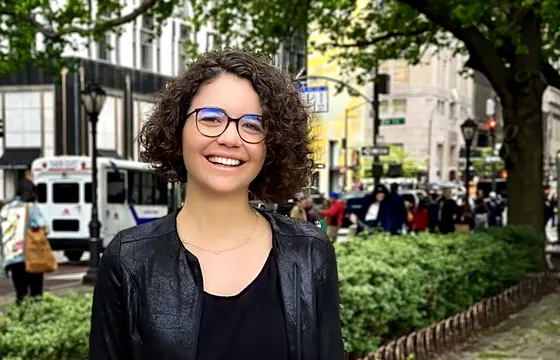With the doctoral awards, the Helmholtz Association annually honors young scientists in each of its six research fields who have carried out their doctoral studies at a Helmholtz center and completed them with outstanding results. Chiara Falcomatà, this year's award winner in the field of health, conducted research at the DKTK site at the Technical University of Munich (TUM) in Dieter Saur's laboratory. She receives the award for developing a novel combined therapeutic approach against a highly aggressive form of pancreatic cancer, mesenchymal pancreatic carcinoma. The cancer is resistant to all standard therapies available today, so even potent combination chemotherapies fail.
Immunotherapies are also usually unsuccessful, as pancreatic cancer is generally very difficult for immune cells to access. Chiara Falcomatà has found a way to make such immunologically “cold“ pancreatic tumors amenable to immunotherapy by specifically combining two anticancer drugs in an animal model in mice.
In an extensive screening of more than 400 therapeutic agents, Chiara Falcomatà discovered two drugs that enhance each other's effect and lead to cell death of the cancer cells. Using the CRISPR gene scissors, the biologist examined in detail which molecular processes are influenced by the drug combination in patient cells and in mice. In the process, she found that T cells are better able to enter the tumor under the combination therapy.
This observation led the researcher to the idea of supplementing the combination therapy with the administration of immune checkpoint inhibitors, which boost the immune defense against cancer. This triple treatment significantly improved tumor response. Mice carrying the highly aggressive mesenchymal subtype of pancreatic cancer showed a clear survival benefit with the triple therapy. If the result obtained in the animal model can be translated to humans, it could represent, for the first time, a potential treatment option for those affected by the disease, which could potentially prove effective in other tumor types as well.
Chiara Falcomatà studied molecular biotechnology in Turin. After completing her PhD, she initially conducted postdoctoral research in Dieter Saur's lab and recently moved to the Icahn School of Medicine at Mount Sinai Hospital in New York, where she is continuing her work on pancreatic cancer.
Award winners receive prize money of 5,000 euros, plus a travel and material grant for a research stay abroad of up to 12,000 euros.
A picture of Chiara Falcomatà is available for download:
Falcomata.jpg
Note on use of images related to press releases
Use is free of charge. The German Cancer Research Center (Deutsches Krebsforschungszentrum, DKFZ) permits one-time use in the context of reporting about the topic covered in the press release. Images have to be cited as follows: “Source: private“.
Distribution of images to third parties is not permitted unless prior consent has been obtained from DKFZ's Press Office (phone: ++49-(0)6221 42 2854, E-mail: presse@dkfz.de). Any commercial use is prohibited.
